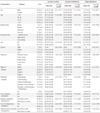Abstract
Purpose
The purpose of this study was conducted to identify the impact of Symptom Severity and Symptom Interference on Sleep Disturbance among cancer patients.
Methods
This study was conducted from October 8th to October 25th, 2012. One hundred eight cancer patients were recruited from S city in Korea. The instruments used in this study were the Symptom Severity, Symptom Interference and the Sleep Disturbance scales for patients with cancer. Data were analyzed using descriptive statistics, t-test, ANOVA, Pearson correlation coefficients and multiple regression with the SPSS/WIN 20.0 program.
Figures and Tables
Table 1
The Difference of Symptom Severity, Symptom Interference and Sleep Disturbance to Characteristics (N=107)

References
1. Ministry of Health & Welfare. Annual report of cancer statistics in Korea in 2009. 2011. Seoul: Ministry of Health & Welfare.
2. Irvine D, Vincent L, Bubela N, Thomson L, Graydon J. A critical appraisal of the research literature investigating fatigue in the individual with cancer. Cancer Nurs. 1991. 14:188–189.

3. Brem S, Kumar NB. Management of treatment-related symptoms in patients with breast cancer: Current strategies and future directions. Clin J Oncol Nurs. 2011. 15:63–71.
5. Kim SH, Lee R, Lee KS. Symptom clusters in patients with breast cancer. J Korean Acad Adult Nurs. 2009. 21:705–717.
6. So WK, Marsh G, Ling WM, Leung FY, Lo JC, Yeung M, et al. The symptom cluster of fatigue, pain, anxiety, and depression and the effect on the quality of life of women receiving treatment for breast cancer: a multicenter study. Oncol Nurs Forum. 2009. 36:E205–E214.

7. Escalante CP, Manzullo EF. Cancer-related fatigue: the approach and treatment. J Gen Intern Med. 2009. 24:S412–S416.

8. Stone P. The measurement, causes and effective management of cancer-related fatigue. Int J Palliat Nurs. 2002. 8:120–128.

9. Bower JE. Cancer-related fatigue: links with inflammation in cancer patients and survivors. Brain Behav Immun. 2007. 21:863–871.

10. Berger AM, Parker KP, Youn-McCaughan S, Mallory GA, Barsevick AM, Beck SL, et al. Sleep wake disturbances in people with cancer and their caregivers: State of the science. Oncol Nurs Forum. 2005. 32:E98–E126.
11. Savard J, Mortin CM. Insomnia in the context of cancer: A review of a neglected problem. J Clin Oncol. 2001. 19:895–908.

12. Sela RA, Watanabe S, Necolaichuk CL. Sleep disturbance in palliative cancer patients attending a pain and symptom control clinic. Palliat Support Care. 2005. 3:23–31.

13. Vena C, Parker K, Cunningham M, Clark J, McMillan S. Sleep-wake disturbances in people with cancer part I: An overview of sleep, sleep regulation, and effects of disease and treatment. Oncol Nurs Forum. 2004. 31:735–746.

14. Frisk U, Nordstrom G. Patients' sleep in an intensive care unit-patients' and nurses' perception. Intensive Crit Care Nurs. 2003. 19:342–349.

16. Mitchell SA, Beck SL, Hood LE, Moore K, Tanner ER. Putting evidence into practice: Evidencebased interventions for fatigue during and following cancer and its treatment. Clin J Oncol Nurs. 2007. 11:99–113.

17. Byar KL, Berger AM, Bakken SL, Cetak MA. Impact of adjuvant breast cancer chemotherapy on fatigue, other symptoms, and quality of life. Oncol Nurs Forum. 2006. 33:E18–E26.

18. Miaskowski C, Cooper BA, Paul SM, Dodd M, Lee K, Aouizerat BE, et al. Subgroups of patients with cancer with different symptom experiences and quality-of-life outcomes: A cluster analysis. Oncol Nurs Forum. 2006. 33:E79–E89.

19. Suh YO. Predictors of quality of life in women with breast cancer. J Korean Acad Nurs. 2007. 37:459–466.

20. Kim YS, Tae YS. The influencing factors on quality of life among breast cancer survivors. J Korean Oncol Nurs. 2011. 11:221–228.

21. Park JH, Jun EY, Kang MY, Joung YS, Kim GS. Symptom experience and quality of life in breast cancer survivors. J Korean Acad Nurs. 2009. 39:613–621.

22. Cleeland CS, Mendoza TR, Wang XS, Chou C, Harle MT, Morrissey M, et al. Assessing symptom distress in cancer patients: The M. D. Anderson Symptom Inventory. Cancer. 2000. 89:1634–1646.
23. Yun YH, Mendoza TR, Kang IO, You CH, Roh JW, Lee CG, et al. Validation study of the Korean version of the M. D. Anderson Symptom Inventory. J Pain Symptom Manage. 2006. 31:345–352.

24. Youn JH. A study on IBS and stress perceived by college women and their dietary habit and sleeping quality [dissertation]. 2005. Seoul: Ewha Univ..
25. Buysse DJ, Reynolds CF, Monk TH, Berman SR, Kupfer DJ. The Pittsburgh Sleep Quality Index: a new instrument for psychiatric practice and research. Psychiatry Res. 1989. 28:193–213.

26. Lee KA. An overview of sleep and common sleep problems. ANNA J. 1997. 24:614–623.
27. Monas L, Csorba S, Kovalyo M, Zeligman R, Dror YF, Musgrave CF. The relationship of sleep disturbance and symptom severity, symptom interference, and hospitalization among Israeli inpatirnts with cancer. Oncol Nurs Forum. 2012. 39:E361–E372.




 PDF
PDF ePub
ePub Citation
Citation Print
Print





 XML Download
XML Download